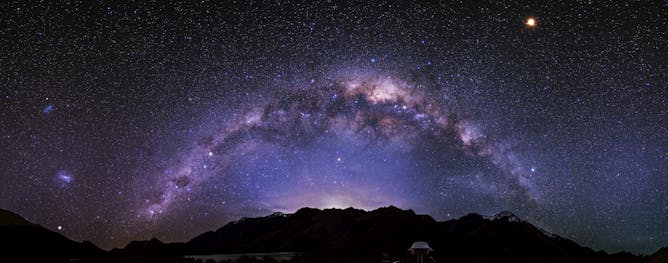|
|
|
Editor's note
|
|
Food writer and critic William Sitwell stepped down yesterday as editor of Waitrose’s in-house food magazine after his astonishingly unpleasant response to a freelance journalist who had pitched a series on vegan recipes was published online, sparking widespread outrage. As vegans themselves, Kate Stewart and Matthew Cole have become used to this hostility, particularly on the part of the mainstream media. Especially galling, they write, is that they are often accused of lacking a sense of humour when objecting to this vitriol. They put it down to moral guilt on the part of many meat eaters.
Ten billion years ago, a galaxy violently crashed into our own – populating the Milky Way with stars, astronomers have discovered. The team used data from the European Space Agency’s Gaia satellite to spot debris from the collision in the shape of some oddly moving stars scattered across the sky. Victoria Scowcroft explains why the finding is so remarkable.
Cape Town’s recent drought brought into sharp relief how people behave and the choices they make when resources become scarce. A catastrophe was averted in large part by people’s willingness to use dramatically less water than normal. According to new research by Astrid Kause and colleagues, it is not altogether surprising that people share important resources when it really matters.
|
Jonathan Este
Associate Editor, Arts + Culture Editor
|

|
|
Top stories
|

Pinkyone via Shutterstock
Kate Stewart, Nottingham Trent University; Matthew Cole, The Open University
No matter the time of the year, it's always open season on veganism.
|

Milky Way from Moke Lake in New Zealand.
Paul Stewart/Flickr
Victoria Scowcroft, University of Bath
The Gaia satellite has uncovered the remains of a galaxy buried deep in the Milky Way.
|

No, please, after you.
TY Lim / Shutterstock
Astrid Kause, University of Leeds
People may be more willing to share scarce resources they really need than apocalyptic Hollywood movies may suggest.
|
Cities
|
-
Richard Tol, University of Sussex
For many world heritage sites, flood risks are increasing. But what about places that don't have the funds for protection?
|
|
Science + Technology
|
-
Sulaf Assi, Bournemouth University
Handheld scanning technology could help police crack down on e-liquids with too much nicotine.
|
|
Business + Economy
|
-
Rick Delbridge, Cardiff University; Nicole Woolsey Biggart, University of California, Davis
Morals and the markets can mix after all.
|
|
Environment + Energy
|
-
Carlos Salvador Zepeda Castillo, University of Portsmouth
This election may be the spark needed for a radical environmental politics.
|
|
Health + Medicine
|
-
Vybarr Cregan-Reid, University of Kent
Modern healthcare may be helping us live longer, but hunter-gatherers point to a less expensive option.
-
Kai Syng Tan, King's College London; Philip Asherson, King's College London
Art is no cure all. But it can open up new spaces for us to ask new questions.
|
|
Arts + Culture
|
-
Adam Parker, The Open University
Tapping into ancient knowledge can help us feel connected to our ancestors – but that doesn't mean we should take their advice.
-
Daniel Van Olmen, Lancaster University
Ever wondered why curry is named after a pop singer from post-war Belfast? So have we.
-
Stuart Logan Lindsay, University of Stirling
Here are some treats you don't have to ring Halloween doorbells for.
-
Maria Haley, University of Leeds
How Romans overcame their fear of witches by finding them funny.
|
|
Politics + Society
|
-
Darren R. Reid, Coventry University
The colonisation of Native America continues through appropriation.
-
Jonathan R. Beloff, SOAS, University of London
The BBC drama about Rwanda tackles post-genocide events in a way few dramas or documentaries have done before.
-
Merav Amir, Queen's University Belfast
Israeli prime minister Benyamin Netanyahu is surprisingly muted when faced with some attacks on Jews. Here's why...
-
David Mitchell, Trinity College Dublin
For a lot of ordinary people in Northern Ireland, the hyper-British version of unionism is missing an important part of their identity.
|
|
| |
Featured events
|

|
Theatre A, Simon Building, Oxford Rd, Manchester, Lancashire, M13 9PY, United Kingdom — University of Manchester
|

|
University Place, The University of Manchester, Oxford Road, Manchester, Manchester, M13 9PL, United Kingdom — University of Manchester
|

|
Merchant Adventurers' Hall, Fossgate, York, York, YO1 9XD, United Kingdom — University of York
|

|
St Martin-in-the-Fields, Trafalgar Square, London, Surrey, TW20 0EX, United Kingdom — Royal Holloway
|
|
|
|
| |
| |
| |
| |
| |
|
|
|
|
|
|
|